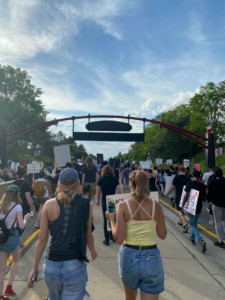
By Paapa Ewool
The Republican candidate’s email was alarming: America is “under assault,” it read. The rule of law is “under siege,” and “mobs of thugs” want to “abolish the police.”
“We have seen what these rioters have done in America’s cities,” Bob Good proclaimed, including “right here in Virginia.”
Indeed, there was rioting, law breaking, injuries and death in the streets of the largest city in the Congressional district Good is hoping to win in next week’s election, Virginia’s 5th District.
That city is Charlottesville, where three years ago torch-toting neo-Nazis, and heavily armed men in military garb gathered for “Unite the Right” demonstrations that pitted protestors against counter-protestors. An avowed white supremacist who drove his car into a rally crowd, injuring 19 and killing a 32-year-old paralegal, was later convicted of first-degree murder.
Good’s campaign has had many of the hallmarks and much of the rhetoric of Republicans’ across the nation, including disdain for the Affordable Care Act, popularly known as Obamacare, and labeling the Democratic rival as “way too liberal.”
The last time a Democrat won the 5th District seat was 2008, but political analysts consider the current contest to be a toss-up, and the turning of another page in the Democratic playbook that could be changing the state’s political hue from deep red to sky blue.
Black is the color of Good’s Democratic rival, Cameron Webb. If he succeeds in Tuesday’s election, he would be the third Black member of the state’s 11-member delegation in the House of Representatives, which now includes only four Republicans.
Last year, Democrats took control of both houses of the Virginia General Assembly and chose Charniele L. Herring as the first Black majority leader in the lower chamber. The governor’s office is up for grabs next year, and so far the only declared candidates for the Democratic nomination are Black—two women and one man.
National Democrats point to Webb’s campaign as an example of the way candidates can win by blending issues often seen to be primarily urban and of color to other concerns and produce victorious, multiracial alliances.
“To bring a lot of folks over [to the Democratic side], you have to talk in a more broader sense about things,” Atima Omara, a Democratic National Committee member from Virginia, told The Root.
“That appeals to a lot of independents who don’t consider themselves Democrats, but are the suburban folks, the rural folks who do see some merit to the arguments the Black Lives Matters activists have been making,” she said.
“I’ve seen marches in parts of the state of Virginia I never thought I would ever see…like rural areas. So the message is resonating and there’s a captive audience.”
***
VIRGINIA VOTING has changed as Virginia’s people have changed. Most of the state’s population growth has been in its urban crescent—the Northern Virginia suburbs across the Potomac River from Washington; the capital city of Richmond and its surroundings; and the Hampton Roads metropolitan area that includes Newport News, Norfolk, and Virginia Beach.
The more recent newcomers to the Old Dominion are younger, more educated and more affluent. They’re not just from other parts of the nation, but from other parts of the world. And they support Democrats more so than the Republicans that polls say are favored in less diverse small towns and rural areas.
In some ways, Webb and Good personify the demographic and political differences of the 5th District, which stretches from the outer suburbs of Northern Virginia to the state’s southern border with North Carolina.
Good is from Lynchburg, a city an hour’s drive closer to that border than it is to Washington, and slightly smaller than Charlottesville. He graduated from and later coached wrestling at Liberty University, the private evangelical Christian college in Lynchburg, and served four years on the Campbell County Board of Supervisors there.
In his own words, Good is a “bright red Biblical and constitutional conservative.” Nationwide, evangelical voters are dominant in less densely-populated areas, which make up the larger share of the 5th District. They ardently support Republican candidates, including President Trump, who carried the district by 11 points in 2016.
Good has linked his candidacy to Trump, who in turn embraced Good as a supportive “strong warrior” in a September telephone call to Good supporters. The president bad-mouthed Webb as a “radical Democrat puppet” who would be loyal to House Speaker Nancy Pelosi, a Democrat.
Webb is a son of Virginia’s urban crescent, born in Spotsylvania County, midway between Richmond and the Washington suburbs. He graduated from the University of Virginia in Charlottesville and is a practicing physician at the college’s medical center who also serves as director of its research-oriented Health Policy Program.
His principal previous role in government was as a member of President Obama’s My Brother’s Keeper initiative, and he remained a member of the White House health advisory team several months into the Trump administration.
During the campaign, he has countered claims that he is soft on law enforcement with the fact that his father spent 20 years working for the federal Drug Enforcement Administration and with endorsements of his candidacy from current and former sheriffs, including one in Campbell County.
Good’s first campaign ad linked Webb to visual images of rioting in an unidentified location. The Democratic Congressional Campaign Committee said the message didn’t match their man, and dubbed it a “racist dog whistle.” Webb asked voters to flip the script.
“The imagery certainly was meant to be provocative,” Webb said. “Even though [Good] attempted in this ad to avoid talking about himself at all, I think he’s just told everybody a lot about himself. …He’s telling us about his approach to politics.”
***
THE 5TH DISTRICT’S population is around 20 percent Black, about the same as the state. Black residents are larger parts of the population in two districts rooted in the urban crescent, and both districts are represented by veteran Black Democrats who political observers say are likely to be reelected next week.
Rep. Robert C. “Bobby” Scott first went to Congress the year Bill Clinton went to the White House, 1993. He represents the 3rd District in the Hampton Roads area, which has a plurality of Black residents. Voters in the district have backed Democrats for president in every election this century.
Scott defeated his GOP challenger by a 2-to-1 margin in 2016, and was unopposed in 2018. The Republican nominee this year is John W. Collick Jr., a 20-year Marine Corps veteran and former immigration officer running for the first time.
The 4th District is similar to the 3rd. Anchored in Richmond, it has a population that is about 52 percent White, and 41 percent Black.
Voters in the district have swung back and forth like clockwork in presidential contests. In 2004, they chose Republican George W. Bush; in 2008, Obama, the Democrat; four years later, Republican Mitt Romney; and in 2016, Democrat Hillary Clinton.
The 2016 election also ended years of GOP hold on the Congressional seat. Democrat Donald McEachin, a 25-year veteran of the state legislature, was elected to Congress. He was reelected in 2018, the same year Leon Benjamin, a Richmond minister who is Black, ran unsuccessfully for a seat on the City Council. Benjamin is now challenging McEachin.
Benjamin’s campaign has him running closer to Trump than farther from him. He criticizes Obamacare as a disappointment, and argues that the mayor of Richmond and Virginia’s governor—both Democrats—should have been tougher on the protest movement that grew after the death of George Floyd in Minneapolis. “They should have stopped it on day one and supported our police,” Benjamin told The Richmond Times-Dispatch.
He also approved of Trump’s decision to play down the dangers of the COVID-19 virus. “What the president has done is kept the panic down,” Benjamin told the newspaper.
McEachin disagreed. “He’s been lying to the public about the severity of the virus,” McEachin said of Trump. Now more than before, maintaining and building on Obamacare is critical, the Congressman said.
“These protests are about 401 years of systemic racism on this continent,” McEachin said of the demonstrations following the killing of Floyd while in police custody. “Trying to make a step for the proverbial more perfect union is really what these protests are calling us to do.”
Virginia political observers give Benjamin slim chances of ousting McEachin, but say his candidacy could help the president.
“There is a conversation going on nationally about Trump’s potential to win a larger than normal GOP share of the Latino and African American vote in 2020,” Daniel Palazzolo, a University of Richmond political science professor, told The Times-Dispatch. “Benjamin might marginally help if that potential emerges in Virginia.”
***
TWO OTHER CONTESTS in Congressional districts that Democrats took from Republicans in 2018 are being closely watched to see if those outcomes will be repeated.
The 2nd District includes Virginia Beach, a major city in the Hampton Roads area, as well as the Naval Air Station in Norfolk. The district’s population is about 2-to-1 White.
President Obama carried the district in 2008 and 2012, both times by about two points. Trump won by 3 points in 2016. Republican Scott Taylor trounced his Democratic opponent by 29 points that year to take the 2nd District Congressional seat. But two years later, Democrat Elaine Luria took it away from Taylor. He is running against her this time in hopes of getting it back.
Both candidates are cut from similar cloth. Taylor is a former Navy SEAL sniper and instructor in marksmanship and reconnaissance who ran unsuccessfully for mayor of Virginia Beach in 2008, and the 2nd District seat in 2010. Luria is a former Navy officer, who spent 20 years on combat ships as a nuclear reactors engineer and retired with the rank of commander.
Republicans seized the 2nd District seat 10 years ago in large part by campaigning against a Democrat who had voted for Obamacare. Taylor is trying the same approach this year, targeting Luria’s vote to impeach Trump.
“This district voted for the president, and that’s one of the reasons this impeachment vote is a big deal,” Taylor told The Washington Post. “Elaine Luria is out of sync with this district on too many issues.
Quentin Kidd, director of the Public Policy Center at Christopher Newport University in Newport News, told The Post that a campaign a decade ago centered on a single issue might not succeed today.
Luria pointed to an analysis of Congressional voting records that rated her 217th among 435 House members on a scale of most conservative to most liberal as proof that she is not the outlier Taylor makes her out to be. “I couldn’t be more in the middle if I had actually tried deliberately,” she said.
The 7th District includes some of Richmond’s suburbs, but is mostly Central Virginia. As in the 2nd District, Whites outnumber others by a 2-to-1 margin. Trump carried the district in 2016.
Former CIA officer Abigail Spanberger won the Congressional seat in 2018, the first Democrat to do that in 50 years. Nick Freitas, an ex-Green Beret who served two tours of duty in Iraq and is a former state legislator, is the Republican hoping to win it back. Voting in the Richmond suburbs was pivotal two years ago, observers say, and could be similarly important this time around.
Overall, Democratic candidates were favored by likely voters in Virginia’s 11 Congressional districts by 8 points in the most recent poll by The Washington Post and George Mason University in Northern Virginia. In the races involving Democrats Webb, Spanberger and Luria, however, the margin was 5 points.
The poll placed former Vice President Joseph R. Biden Jr., the Democratic nominee, ahead of Trump by 11 points going into the final two weeks of the campaign.
***
REPUBLICAN POLITICAL fortunes in Virginia have continued to fall—and the political prospects for Democrats and Black politicians rose—since Trump lost the state and its 13 electoral college votes in 2016.
Democrats flipped 15 seats in the state House and held on to the governor’s office in 2017, and flipped three Congressional seats and held a U.S. Senate seat the year after that. Last year, they took control of both houses of the Virginia General Assembly.
It was 1989 when Virginians chose Democrat L. Douglas Wilder as the nation’s second African American governor, the first in Virginia. Already, three Black Democrats have launched campaigns to become the state’s second in the 2021 elections.
Wilder had served as lieutenant governor before winning the higher office, and one of next year’s announced hopefuls is the current No. 2, Justin Fairfax. His path to the nomination could be hampered by accusations of sexual assault that surfaced last year.
A California university professor said Fairfax forced her to perform oral sex in his hotel room at the Democratic National Convention in Boston in 2004, and another woman alleged that Fairfax raped her in a Duke University fraternity house when they both were students at the school in 2000. Fairfax has not denied the sexual encounters, but said both were consensual.
State Sen. Jennifer McClellan, a Richmond area legislator, and State Rep. Jennifer Carroll Foy, whose district is in the Washington suburbs of Northern Virginia, also have announced their candidacies. The election of either one would give the state its first female governor.


